Kicking off the second round of Stripped events at the Edinburgh International Book Festival came the legendary and fabulous Melinda Gebbie, known for her work in the American underground comix of the ‘70s, the infamous and illegal Fresca Zizis, and of course her collaboration with Alan Moore on Lost Girls.
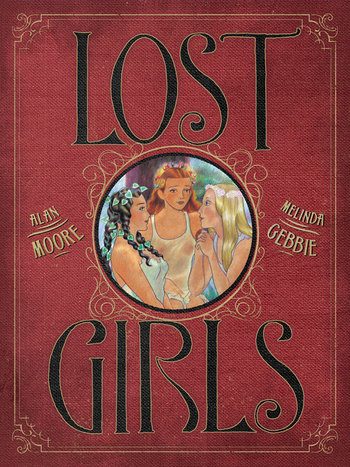
[One or two images potentially not entirely safe for work, depending on your work]
A special mention here for the chair, Teddy Jamieson of The Herald and Sunday Herald, who provoked some wonderful discussion that was of equal interest to those familiar with Gebbie’s work, and newcomers.
Gebbie is a UK resident, having moved to England in the early ‘80s to work on the animated film adaptation of Raymond Briggs’ When the Wind Blows. Already well established as an underground comix creator, Lost Girls first came about in the early ‘90s when Gebbie collaborated with Moore on an 8 page story for an anthology titled Tales of Shangri-La, a project that never came to be due to a lack of publisher interest.
Having spent three weekends talking about their sexual politics and what they saw as the failures of pornography, and erotica, “pornography lite”, a new project was born: Lost Girls.
“I never actually realised how long it was going to take,” said Gebbie, of the 16 year process behind the book, explaining that previous projects had rarely been any longer than 12 pages.
Except from working with the animation studio, she clarified, saying that, “working on animation in those days was kinda like being addicted to methamphetamine!” The work had to get done around the clock and nothing else mattered.
During the creation of Lost Girls the working partnership between the two collaborators became a romantic partnership. Had the dynamic changed, Jamieson asked.
“It made it more ticklish,” Gebbie smiled. “We had a very professional relationship.” The artist explained that when discussing the project they kept their “business heads” on, and that of course during the period, Moore was working on at least 6-8 other projects, with several other collaborators. His head was “absolutely swimming” with projects all the time.
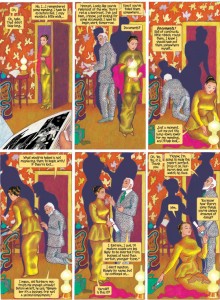
“We’re practically like an Edwardian little couple,” Gebbie laughed. Jamieson told the audience that Melinda and Alan had had their honeymoon in Edinburgh, suggesting that in a parallel world, that had made for the best Hello cover ever – causing Gebbie to have a major fit of the giggles.
Moving on to her history in underground comix, Gebbie talked about her experiences working for Wimmen’s Comix, a title she said, as if it was an entirely new concept, “like comics for beagles or something”.
There had been only 12 women working in the underground comix community at that time in San Franscisco, with around 30 men. Three of those men, Gilbert Shelton, Robert Crumb, and Art Spiegelman, had enough work for them to work on their comix full time.
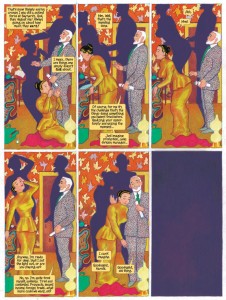
“I brought sexual politics to [my] comics,” she explained, saying that she had been deeply interested in personal rights for women and fighting back against the system. But at that point, “it was not a coagulative movement, if that is a word.”
This was mostly, she said, due to the strange politics of San Francisco at that time. On attending one feminist meeting with two friends who were wearing make-up, they were told to leave and denounced as “breeders”.
At the gay parades, men gave leaflets to men, and women gave leaflets to women, with no interaction between the two sides. “We could not progress,” she said, “there was such factionalisation.”
“San Fransciso was a great place for weirdness of all sorts,” Gebbie said, reminiscing about the influx of punk and the role fashioned played in movements.
The artist explained how she had first got into comics after visiting a small independent publishers fair, where she met Lee Mars – one of the founders of Wimmen’s Comix – a “genuinely funny woman”. Gebbie spoke a little about how Marrs’ The Further Fattening Adventures of Pudge, Girl Blimp, combatted the “sexual fascism” that existed in that area, so close to Hollywood’s Babylon, where no one would listen to you unless “you were a size 8”, regardless of how bright you were.
There was huge hostility from male cartoonists towards the women working on their own comix. Gebbie told of how during a phone argument with S. Clay Wilson, he had said, “women aren’t supposed to be artists. They have babies, that’s what women are for”.
Reminding us that while this was a few years back now, it wasn’t that long ago, she said it was “quite extraordinary how backwards we were about human rights and human capabilities”.
Moving on to Lost Girls, Jamieson asked whether pornography was a term she was happy with when referring to that work.
“Well, I’m used to that term now,” Gebbie answered, pointing out that the only other term was erotica which didn’t really fit right. Lost Girls is drawn nicely, which is a decision that Gebbie made, to make it “look like a children’s book but for grownups.”
She said it was quite possibly the only pornography (of this form) that had been done “expressly for women”, to look beautiful for them and to celebrate female sexuality.
Gebbie spoke about how she had collected all kinds of magazines, and had a friend who had been editor on the infamous LA Star (“one floor down from John Cassavetes’ office”) and had edited infantile sexual magazines, “things about enemas, all sorts of crazy magazines!”
“I always found the variations of peoples interests quite fascinating,” she smiled.
On the intentions behind Lost Girls, Gebbie said, “we wanted to do a pornography that would appeal to women”. Moore had been following her underground career, long before he met her, and she had done a pastiche of the Story of O.
“I think the new lady who’s done the 50 shades of beige or whatever has done her version of it. Except that poor woman’s probably not had sex.”
But hers had been a response to the sexual savagery on the part of the male cartoonists. “They were some of the most backward guys in terms of their fears and belief systems, and their sexism. They were classically untrained in the consciousness of appreciating women.”
Many years ago, said Gebbie, she had often attended the San Diego Comic Convention with other underground cartoonists in the late 70s/early 80s, at the El Cortez.
People like Dan O’Neill and “the great” Harvey Kurtzman were there, and they “swam nude in the pool” and stayed up all night, playing guitar and singing. Gebbie had gone to a panel discussion featuring Kurtzman (“huge respect to Harvey”) and other cartoonists, saying, “oh well, y’know women don’t have any sense of humour do they? Or any discernible sex drive either.”
(Gebbie took a little aside here to talk about how artists should always always hold on to their work, as Kurtzman had only been able to keep two of his Little Annie Fanny strips from Playboy, depriving him of a huge amount of income.)
Gebbie had stood up on the spot to attack this idea, thinking it was an incredibly dangerous belief for people to hold, stating “I don’t know if all you do is hang around your mom all the time, but women do too have a sexuality and they do too have a sense of humour, it’s just that their sense of humour, you might find a little bit stinging! They’re too protective of you guys to subject you to it!”
Asked about the reaction to Lost Girls, the artist said that it has been almost all positive. “We’re not on the internet”, said Gebbie, but they do get sent reviews to read. Michael Faber’s review she said, had made her cry (Faber praised the sincerity of the book, and likened it to William Blake).
Jamieson brought up the one part of the book that had discomfited him: the incest. What’s my problem? he asked.
“Well, it’s always just about what you respond to and what you don’t respond to,” Gebbie answered. She went on to talk about how everyone has their personal preferences, friends and family included, when it came to the book, and that that was absolutely fine. Some of her friends, she said, had been really offended by it. “I didn’t take it personally, it’s just territory they didn’t feel comfortable with.” An outlook I greatly admire!
Talking about the imitation embroidery in the book, Gebbie joked that she almost went blind, which was physically and physiologically demanding. Drawing these “tiny tiny little penises spurting all these little pearls all over this giant ball gown” involved her sitting for a few minutes at it then having to talk around the room and come back to it, again and again.
The single thing, said Gebbie, that made the book difficult and why it took 16 years, was that she wanted it to be “irresistibly beautiful and tender” and wanted that “to transfer to the reader”, that it’s meant to effect you “like a beautiful memory” which is why the artwork is hazy and colourful. Gebbie spoke about how the colour had a character role to play, and how she wanted “all women who picked it up to feel comfortable looking at it.”
While the subject matter doesn’t appeal to everyone, she wanted that “tenderness towards my fellow women to be evident”. Gebbie explained that one of the biggest problems she had with her early experiences of feminism, was that there was so much competition and sabotage within the movement, as well as cruelty towards body shapes and different ways of presenting yourself.
“None of these things are as important as what you are inside and what you are capable of expressing as a human being.” The artist led into how it is so profitable for the media and the cosmetic industry to make us feel that we are unattractive and that that holds us back.
“That’s all irrelevant,” declared Gebbie. “What we need is to find out what we’re best at, find out how best we can express our affection for other people, make a difference in the world, be kind to each other, and get across a tenderness.”
Saying that she wouldn’t have the time to spend another 16 years on Lost Girls, the artist talked about how glad she was that she did the project, and that she has never regretted any part of it. “I feel I did everything I could.”
Jamieson next brought up the current campaign in the UK that focuses on getting rid of Page 3 in the Sun (a naked pin up page in a leading tabloid) and lads mags from supermarket shelves. How did Gebbie feel about that given the ongoing power of the male gaze?
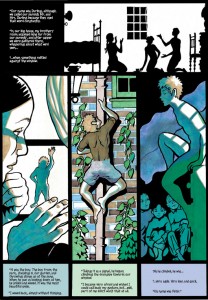
“I’m completely anti-censorship,” she added, saying that pictures of unfair wars where children are being hurt is surely far more damaging than any pictures of sex could ever be.
“I just think that more things with female gaze involved with it are going to work their own good health results. The male gaze is more evident because there is a longer history of it.” Gebbie spoke about how there are good women film makers, pornographers, and so forth. “I’m very pleased that there are more women in comics, absolutely thrilled about that.”
She spoke about how she hoped women in comics today were organising together, but in a “mutually positive way”, and that the younger women are more involved with the idea that we are there to support each other – women and men. And that we should all feel like we have the right to have our say.
Censorship was definitely something Gebbie spoke out about, saying that pro-censorship of anything can lead to the censorship of things we need, and that are important.
This led into an interesting question from Jamieson, on whether we can say that the imagination should never be policed, referring to rape fantasies in particular, not when women have them, but when men fantasize about being a perpetrator.
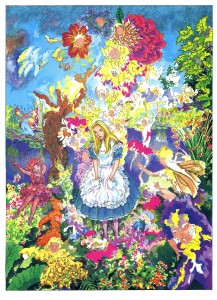
“Why don’t we have anti-tyrant rules?” she posed. “Why are people allowed to come into government looking like, oh let me pick one without using a name, that one that looks like an albino ape. That scratches his head and looks like a fun guy. And he’s actually a former thug who used to like to get involved in going around in a gang and threatening people.” [Points to any non-UKer who recognises this one!]
“Politics doesn’t seem to have an imaginary world that you can work from, and get an idea down on paper… If you have imagination you’re probably a little less likely to be a murderer. You’re probably a little less likely to be a tyrant, or a monster. Because you can imagine, and probably then empathise, with the people you are about to dictate to, or hurt.”
Questions were then opened to the floor, with the first question asking if a digital version of Lost Girls was forthcoming.
An idea for this had previously been floated, but Gebbie said that she “wasn’t completely comfortable with that idea at the time”. Saying that she wasn’t against digital books by any means, Kindles just weren’t for her.
“Alan and I collect lots and lots of books,” she said, talking about her love for her own library, and for collecting films as well. She added that “if somebody can make it fun for me and show me what the ups and downs of it is, then yeah I’d take a look at it”. But that if Alan wasn’t interested then it wouldn’t go ahead. “Unlike some of his other former collaborators, I don’t do anything without wanting his blessing on it. It was an alchemical work of magic.”
Gebbie spoke briefly about the various books Moore had created that had gone on to become films, that had all been badly made or badly thought out, and had all ignored the core idea in his writing. “It’s just all gone wrong for him so he hates those projects. I never want him to hate Lost Girls.”
The next question referred back to Gebbie’s own SDCC tale, and brought up the kerfuffle a few years back along with the creation of Womanthology, a project that Gebbie had not heard of.
I was personally quite surprised that Gebbie had not been approached to take part in Womanthology, lack of internet access aside, but she expressed great interest in the project itself.
“It sounds like it was never won,” said Gebbie of the battle against sexism in comics. “And the thing is, it is very very easy to convince a female creator that she is not up to standard. Women have been easily manipulated all these years.”
Gebbie talked a little about how few women creators she knew these days, but said she knew many women artists in Sweden, and that there were other countries that were so much more supportive of women in comics.
“DC and Marvel are pigs,” she said, speaking about her comic Cobweb, where an issue was spiked because it talked about L Ron Hubbard, Jack Parsons and Scientology. Yet they had already published a book on that subject before.
“I will say that I think superheroes are an unfortunate sewage system of kudzu that’s taking over comics, lacking storyline, lacking heart, the same old stuff. I think it’s fine if if guys like pictures of other guys in tights, that’s fine… or dogs in capes – although it was cute when Alan did it, but no. There’s no storyline there. It’s industrial effluent, and it just keeps on rolling on.”
Gebbie said god bless to any creative person out there who wanted to create storylines, who had a heartfelt reason for doing their work.
The next question asked about the script for Lost Girls given Moore’s tendency to create very detailed scripts. Was Lost Girls more of a free flowing project?
“No, Alan doesn’t do free flowing!” laughed Gebbie. She said the script design had been very similar to the ill-fated Big Numbers, explaining that his printing is ridiculously tiny. First thing he had asked was what she wanted to draw, and the comic was built around that.
Gebbie added that Moore had dialogued the comic after she had drawn the pages, matching the speech perfectly to her faces, “which I think is kinda genius”. Moore had also provided thumbnail sketches for her, which was a “huge help” as she wasn’t used to collaborating with a writer.
Jamieson asked whether there had been a discussion about whether there were any subjects that Lost Girls should avoid.
Gebbie answered that there had been two – the book contained very light bondage towards the end, because bondage is a contentious issue, with the curtailing of personal freedom; and religious iconography had been taken out in case it was taken as being anti-papist.
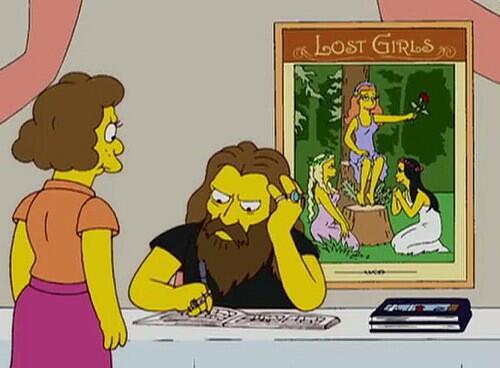
The next question from an audience member asked what comic of her had been seized by customs, and why.
This was Fresca Zizis, much of which will be included in an upcoming collection of her black and white work. Gebbie discussed how her underground work had seen her being hugely “involved in bringing art movements forward.”
Fresca Zizis, which means fresh cocks, was seized by customs on entry to the UK. “There were a lot of steamy stories in it,” she explained. And the judge, who was apparently Richard Branson’s father – “still alive on some island of the dead!” – had asked her to stand up for herself, and she had said that “it wasn’t meant to be an obscene act or something I did for cheap reasons. The stories in here are actually based on what it’s like to be a person in this underground comix scene. This is a book of cautionary tales and it is not meant to titillate.”
The judge had given it a week and then “several hundred copies were burned, and then it was made completely illegal in England.”
The final question was whether Gebbie believed that sexual politics could be challenged via mainstream comics or whether it was best suited to the underground.
She answered that publishers like Jonathan Cape and Faber were buying up everything, resulting in some “very inferior” comics coming through her door. She said that she wouldn’t take anything with sexual content to those kind of publishers, as they were trying to appeal to the widest audience possible, and that to do required a lot of bravery on the part of the creator.
She spoke about how she had wanted to break into children’s books, and had taken some highly sexual art amongst her portfolio along to the publisher meeting. Funny now, not at the time!
The talk over, Gebbie sat and signed copies of Lost Girls and chatted to each person until everyone had left, beaming and clutching their heavy books. The event had been rather quiet in terms of audience size, but the passion of each individual person present was quite palpable. I await Melinda’s upcoming collection with glee!
Laura Sneddon is a comics journalist and academic, writing for the mainstream UK press with a particular focus on women and feminism in comics. Currently working on a PhD, do not offend her chair leg of truth; it is wise and terrible. Her writing is indexed at comicbookgrrrl.com and procrastinated upon via @thalestral on Twitter.


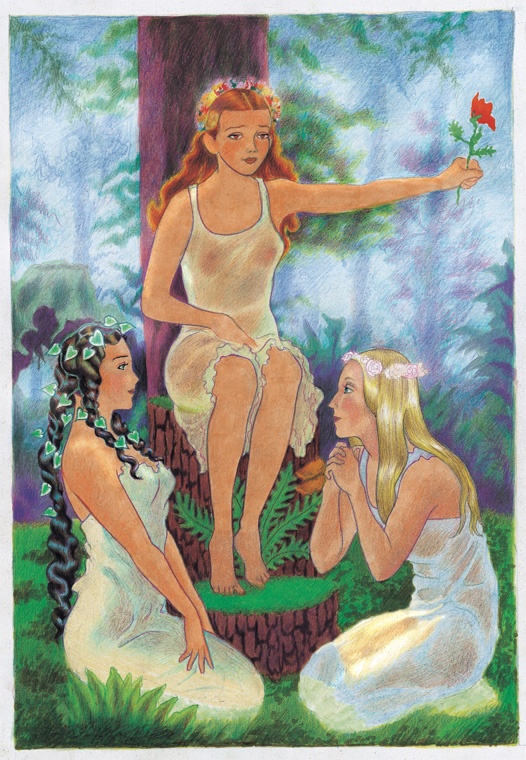

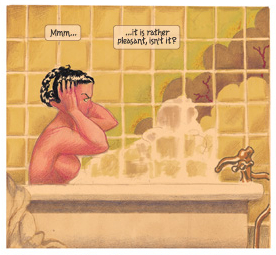
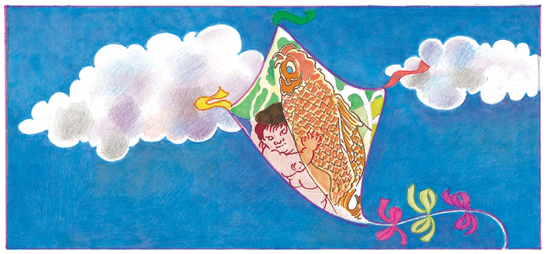
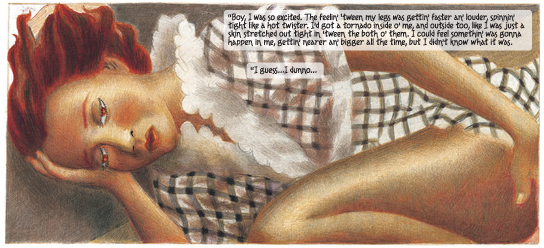
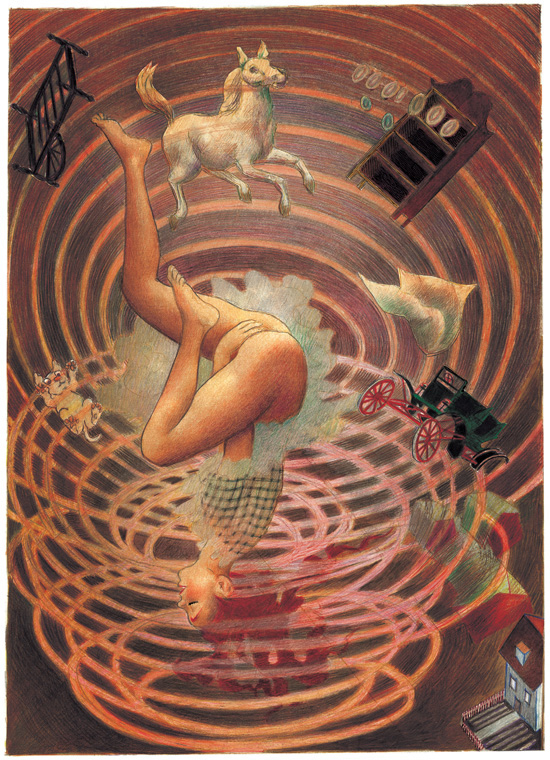
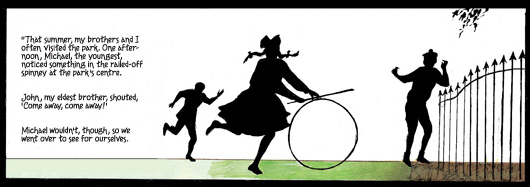
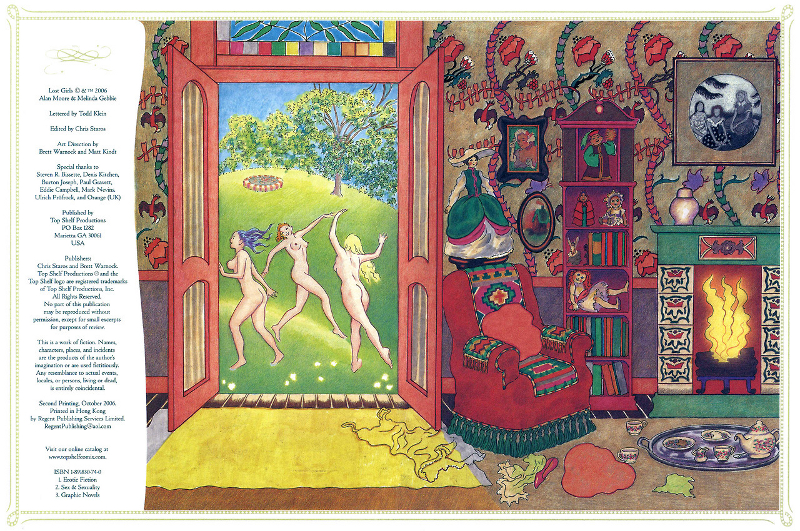
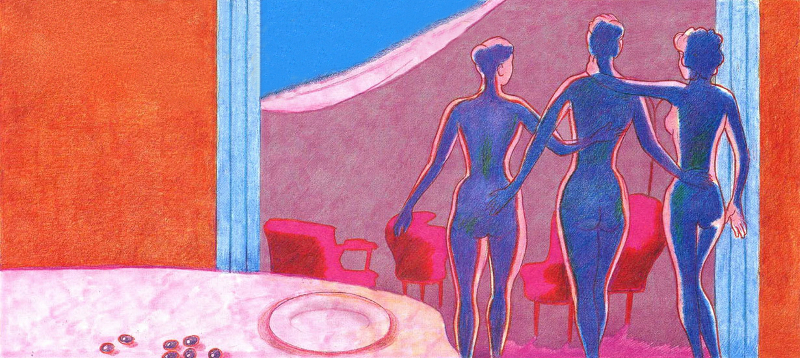





(Apologies for the delay on my Stripped write-ups, I was struck by a horrible bug! Will power through the rest from today onwards ^^)
Hmm, according to its website, Top Shelf has digital versions of the 3 individual books of Lost Girls at http://www.topshelfcomix.com/catalog/melinda-gebbie, though not of the combined edition.
Thank you very much for this captivating report. It’s very nice to hear from Melinda on all these subjects. One question,though. At the conclusion, you mention her “upcoming collection.’ I may have missed an earlier reference – what collection? Can you provide more details?
Hi Steve, apologies for not making this clearer. It’s mentioned earlier in the write-up:
“This was Fresca Zizis, much of which will be included in an upcoming collection of her black and white work.”
There wasn’t much information as I think it’s quite possibly in the early stages, but Melinda mentioned that she was discussing this with an interested publisher at the moment.
“(Gebbie took a little aside here to talk about how artists should always always hold on to their work, as Kurtzman had only been able to keep two of his Little Annie Fanny strips from Playboy, depriving him of a huge amount of income.)”
Laura – of how many complete Annie stories do you think Kurtzman should have retained ownership of the physical art?
Comments are closed.